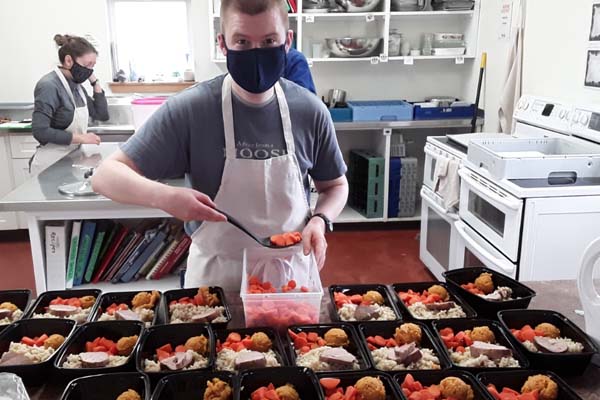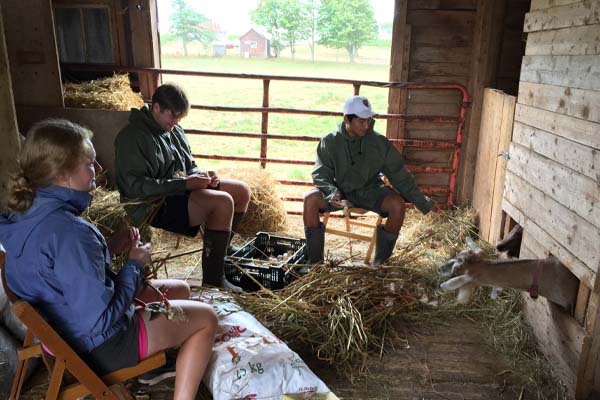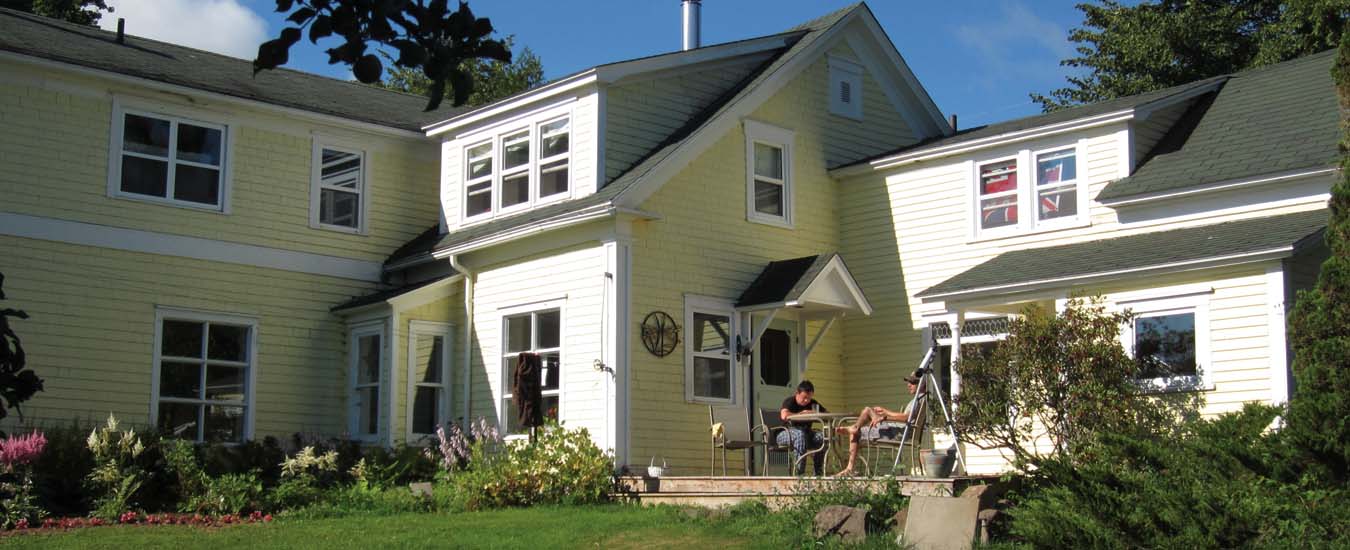Open Sky Co-operative is geared to young people living with autism
Many years ago, two couples—Margaret and Eric, Norm and Laura—sat around a dinner table talking about their careers, their dreams, and their kids. As time went on, the conversation at the table kept returning to the experience of raising children who have autism.
“I used to say, ‘I wish there was someone like Norm who could work with my kids in some kind of farm setting,’ because one of my kids was absolutely magnificent at looking after animals,” recalls Margaret Tusz-King. “One night, in 2010, when we were having one of those same old conversations, my husband Eric got out the computer and started working on the business plan.”
When an 11-acre heritage property used as a hobby farm came up for sale on the outskirts of Sackville, New Brunswick, the four friends headed out to see it.
“I remember Norm standing on the edge of the field and saying it was like the ocean and I said, ‘Yeah, it’s something about that open sky,’ and his wife said, ‘That’s it. Open Sky!’ That’s how we came up with the name,” Tusz-King continues.
That’s how Open Sky Co-operative, Margaret’s wish for a safe and welcoming farm, space geared to young people living with autism, was born.
The only one of that original team still at the farm, Margaret wrapped up her job as Executive Director in June. In a letter of resignation posted on Facebook in January, she wrote, “Open Sky touches hundreds of lives annually through weekday and residential skills programs, in-home supports, public Mental Health First Aid training, and a unique model for employment and new business mentoring and development. It is such a pleasure, for all of us who shared an initial dream, to see this to its fruition.”
Welcoming and nurturing space
The main building at Open Sky Co-operative, which opened its doors officially in 2011, is a sprawling, yellow-painted heritage farmhouse dating back to 1790. It provides rooms for two residential clients as well as office space on the main floor. The former driving shed, built in 1850, was converted into a large but cozy gathering space off the kitchen for eating and meeting.
This is the farm that was Margaret Tusz-King’s home-away-from-home for 10 years. She is understandably proud of what Open Sky has become for families living with autism: A welcoming, nurturing place of gardens and animals, chores and responsibilities. It’s a space tailored to the needs of each individual who comes to the farm seeking a way to live a meaningful, productive life using their unique skills.
“When we used to have someone unusual in the community several generations ago, there always was a place for them. They were the hired hand, the labourer hired to help with the haying or milking. There always was a role and a place for people with different abilities,” Tusz-King says. “So, farm work and working with plants and animals has traditionally been a place for people to find work and engagement. It’s non-judgemental, basic, meaningful work that can be ideal for people who may otherwise feel like they don’t fit in.”

Sky participant, Harris McSheffery, prepares food boxes for the elderly. Photo credit: Courtesy of Open Sky Co-Operative Ltd.
No big deals
Open Sky engages with young adults once they have graduated from high school because that’s when they struggle to find employment or live independently, explains program co-ordinator Michelle Melanson, who joined Open Sky in 2015. She says that many people with autism struggle to organize their day, so “we help them build skills so they can manage their own lives.”
This is why there are bright, eye-catching visuals everywhere at Open Sky: inspirational quotes, drawings on a brainstorming session, labels on every container, reminders, and a huge white board in the main hallway.
Melanson calls that the ‘choice board’. “Rather than tell participants what they’re doing, we want them to have some control so they’re doing something they’re interested in, whether it’s taking care of the donkeys, or harvesting a new vegetable, or cooking a meal,” she says. “They plan their own menus, they plan their own day. They have their schedules so they can write it out themselves.”
At the heart of the program is learning through experience, including mistakes. Tusz-King notes the school system often won’t let young people with disabilities fail, won’t trust them to survive failure. Open Sky counters that notion, as well as the idea that people with disabilities can’t be trusted to be on their own.
“Most of us have our best learning when we botch things up,” she says with a laugh. “We have to trust that people can pick themselves up after they’ve failed at something. That’s a part of resilience. Our way is to support people through that kind of learning. We live in a very punitive society that often judges us on our failures so we’ve created this safe environment, and for our staff as well.”
That’s why it was no big deal when the red currant scones promised for morning break do not appear.
“They didn’t work out,” the young woman wearing an apron says with a smile and a shrug. Instead, cranberry muffins sit on a plate alongside the
tea pot.

The Open Sky crew preparing garlic seed for planting while the goats look on. Photo credit: Courtesy of Open Sky Co-Operative Ltd
Pandemic impacts
In 2019, Open Sky opened a tearoom, a more public enterprise in allowing young adults to explore and experience and learn.
Peter, an Open Sky client with a love of baking, wanted to be able to bake without having to eat it all. Through Open Sky’s “BYOB—Be Your Own Boss” employment development program, he and another participant started up a tea room that opened every Sunday afternoon throughout
the summer.
“The tearoom gave them a focus to get the baking done, and sent them home with money in their pockets,” says Tusz-King. “Since we opened up the farm to the public for Sunday afternoons when they have the tearoom, it provided a double purpose. It was an extension of our program and it made a community connection by bringing people to our beautiful farm.”
Of course, the Covid-19 pandemic impacted the tearoom and all other programs at Open Sky.
“We’d never done any online programming before,” says Melanson, “but we were able to offer events like cooking classes, trivia games, and dinner parties. We offered one hour a day when people could get together and talk.”
Staff later organized two walks a day downtown that brought everyone together safely and allowed staff to monitor how the clients were doing.
With its work centering around farming and livestock, Open Sky is able to continue offering modified programming for its participants, following government regulations and health protocols.
“Last summer, we had an event every Thursday afternoon called ‘Under the Oak Tree’ to play washer toss or write songs, do mechanics or have music lessons,” Melanson says. “Now we’re back to normal programming on site and we can invite volunteers and plan outdoor events again.”
Everyone is looking forward to gardening again because food is truly the door of opportunity for those working at Open Sky. From the work of planting seeds, weeding and harvesting, to collecting eggs to baking and cooking for breaks and lunch, the skills needed for self-sufficiency and self-confidence are found in the creation and preparation of food.
According to Melanson, many of the participants at Open Sky will struggle financially due to the nature of the workplace and their disabilities “so it’s important for them to learn how to grow their own food and harvest it and keep themselves eating healthy, which can be very expensive. If they learn these skills of growing their own food, then they can help themselves so much over the course of their lives. This is a vital life lesson.”
It can begin with something as simple as learning how to make a salad dressing. The success of a recipe turning out boosts self-esteem and makes that participant more likely to try different activities.
A model for other provinces?
This is why the outgoing Executive Director wishes workplaces would lighten up about the rigid expectations about what people should look like and how they should behave. For example, autistic people often have their most difficulties with communication.
“Every job ad you see, the number two quality they want is good communication skills. Why do you need good communication skills if you work alone in a warehouse?” Margaret Tusz-King wants to know. “When you’re hired to stock shelves, why do you also need to be able to do customer service and work a cash register? Why can’t we
create the jobs to fit the skills of the people who are willing to get there on time every day and value the opportunity to work?”
This is what makes Open Sky different from other employment programs for people with disabilities, she adds. “We believe we have to transform the workplace to meet people’s real needs.”
In an echo of Tusz-King when she first stepped onto the property that would become Open Sky, Michelle Melanson has her own wish for this unique program.
“We are the only one in Atlantic Canada but there’s a great need for what we’re doing because after high school, there are no services. With the number of people with autism growing, the need is only going to get greater. We’d like to expand. We think this should be in every province.”
